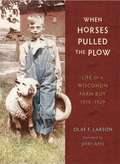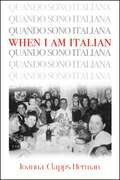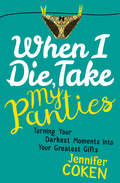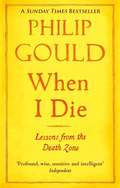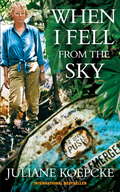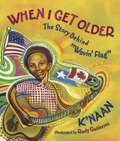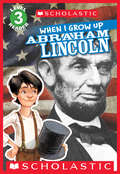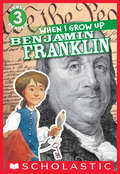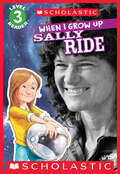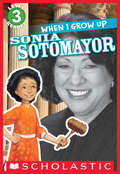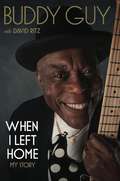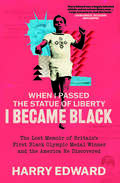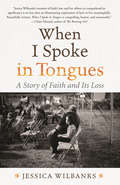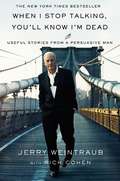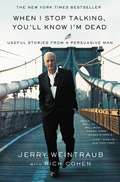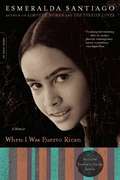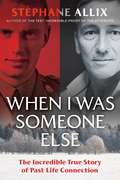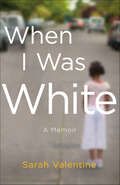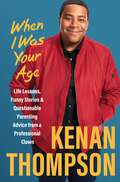- Table View
- List View
When Horses Pulled the Plow
by Olaf F. LarsonIn 1910, when Olaf F. Larson was born to tenant livestock and tobacco farmers in Rock County, Wisconsin, the original barn still stood on the property. It was filled with artifacts of an earlier time--an ox yoke, a grain cradle, a scythe used to cut hay by hand. But Larson came of age in a brave new world of modern inventions--tractors, trucks, combines, airplanes--that would change farming and rural life forever. <P> When Horses Pulled the Plow is Larson's account of that rural life in the early twentieth century. He weaves invaluable historical details--including descriptions of farm equipment, crops, and livestock--with wry tales about his family, neighbors, and the one-room schoolhouse he attended, revealing the texture of everyday life in the rural Midwest almost a century ago. This memoir, written by Larson in his ninth decade, provides a wealth of details recalled from an earlier era and an illuminating read for anyone with their own memories of growing up on a farm.
When I Am Italian (Excelsior Editions)
by Joanna Clapps Herman"My ancestral Italian village in America was in Waterbury Connecticut." In this sentence, Joanna Clapps Herman raises the central question of this book: To what extent can a person born outside of Italy be considered Italian? The granddaughter of Italian immigrants who arrived in the United States in the early 1900s, Herman takes a complicated and nuanced look at the question of to whom and to which culture she ultimately belongs. Sometimes the Italian part of her identity—her Italianità—feels so aboriginal as to be inchoate, inexpressible. Sometimes it finds its expression in the rhythms of daily life. Sometimes it is embraced and enhanced; at others, it feels attenuated. "If, like me," Herman writes, "you are from one of Italy's overseas colonies, at least some of this Italianità will be in your skin, bones, and heart: other pieces have to be understood, considered, called to ourselves through study, travel, reading. Some of it is just longing. How do we know which pieces are which?"
When I Die, Take My Panties: Turning Your Darkest Moments into Your Greatest Gifts
by Jennifer CokenA daughter cares for her dying mother in this intimate memoir of ovarian cancer, frank conversations, and finding peace through laughter and gratitude. In 2006, Jennifer Coken&’s mother was diagnosed with stage four ovarian cancer. She had a slim chance of living another five years, but she chose to spend her remaining days tap dancing through chemotherapy and loving her family and friends ferociously. In this witty and heartfelt memoir, Jennifer recounts how she found the strength to care for her mother and cope with her death while facing troubles in her own life. Challenging circumstances force us to face a harsh reality; so often we want to control life—and the truth is we can&’t. This is a story of how personal transformation can come from tragedy if we are willing to find it. Above all, it is a wake-up call for anyone who needs the courage to have heartfelt conversations with the people they love right here, right now.
When I Die: Lessons from the Death Zone
by Philip GouldOn 29 January 2008 Philip Gould was told he had cancer. He was stoical, and set about his treatment, determined to fight his illness. In the face of difficult decisions he sought always to understand the disease and the various medical options open to him, supported by his wife Gail and their two daughters, Georgia and Grace.In 2010, after two hard years of chemotherapy and surgery, the tests came up clear - Philip appeared to have won the battle. But his work as a key strategist for the Labour party took its toll, and feeling ill six months later, he insisted on one extra, precautionary test, which told him that the cancer had returned. Thus began Philip's long, painful but ultimately optimistic journey towards death, during which time he began to appreciate and make sense of his life, his work and his relationships in a way he had never thought possible. He realized something that he had never heard articulated before: death need not be only negative or painful, it can be life-affirming and revelatory.Written during the last few months of his life, When I Die describes the journey Philip took with his illness, leaving to us what he called his lessons from the death zone. This courageous, profoundly moving and inspiring work is as valuable a legacy to the world as anyone could wish to bestow - hugely uplifting, beautifully written with extraordinary insight.
When I Die: Lessons from the Death Zone
by Philip GouldOn 29 January 2008 Philip Gould was told he had cancer. He was stoical, and set about his treatment, determined to fight his illness. In the face of difficult decisions he sought always to understand the disease and the various medical options open to him, supported by his wife Gail and their two daughters, Georgia and Grace.In 2010, after two hard years of chemotherapy and surgery, the tests came up clear - Philip appeared to have won the battle. But his work as a key strategist for the Labour party took its toll, and feeling ill six months later, he insisted on one extra, precautionary test, which told him that the cancer had returned. Thus began Philip's long, painful but ultimately optimistic journey towards death, during which time he began to appreciate and make sense of his life, his work and his relationships in a way he had never thought possible. He realized something that he had never heard articulated before: death need not be only negative or painful, it can be life-affirming and revelatory.Written during the last few months of his life, When I Die describes the journey Philip took with his illness, leaving to us what he called his lessons from the death zone. This courageous, profoundly moving and inspiring work is as valuable a legacy to the world as anyone could wish to bestow - hugely uplifting, beautifully written with extraordinary insight.
When I Fell From The Sky: The True Story of One Woman's Miraculous Survival
by Juliane KoepckeOn December 24th 1971, the teenage Juliane boarded the packed flight in Peru to meet her father for Christmas. She and her mother fought to get some of the last seats available and felt thankful to have made the flight. The LANSA airplane flew into a heavy thunderstorm and went down in dense Amazon jungle hundreds of miles from civilization.She fell two miles from the sky, still strapped to her plane seat, into the jungle. She was the sole survivor among the 92 passengers, which included her mother, and Juliane s unexplainable survival has been called a modern-day miracle.With incredible courage, instinct and ingenuity, she crawled and walked alone for eleven days in the green hell of the Amazon. She survived using the skills she d learned in assisting her parents on their research trips into the jungle before coming across a loggers hut, and, with it, safety. Now she tells her fascinating story for the first time and on its 40th anniversary she shares not only the private moments of her survival and rescue but her inspiring life in the wake of the disaster.
When I Get Older: The Story behind "Wavin' Flag"
by K'NAAN Sol Sol&“Wavin&’Flag&” has become an international anthem. Its powerful words of hope have crossed generations and borders, and have made K&’NAAN an international star.In his first book for children, When I Get Older, Somali-Canadian poet, rapper, singer, and songwriter K&’NAAN tells his own story. Born in Somalia, he grew up in Mogadishu. His grandfather was a renowned poet who passed on his love of words to his grandson. When the Somali Civil War began in 1991, K&’NAAN was just thirteen. His mother made the difficult decision to move her family so that they could grow up in safety. First in New York and then in Toronto, K&’NAAN faced many challenges.Like so many other immigrants, he had to make a place for himself in a world of alien customs, clothes, and language. His road was a hard one: he lost many friends to violence. But K&’NAAN&’s love of music, and his enormous talent, became a way for him to connect with his past, with his classmates, and eventually, to millions of people around the world. Not only does K&’NAAN tell a story that will inspire and encourage young readers, but he provides a brief history of the Somalian conflict. The lyrics of &“Wavin&’ Flag&” are also included.Born Keinan Abdi Warsame, K&’NAAN first came to prominence when he performed a spoken word piece before the United Nations High Commissioner for Refugees in 1999. A member of the audience, the singer Youssou N&’Dour, was so impressed that he asked K&’NAAN to take part in an album and to tour with him.Since then, K&’NAAN has performed in more than 86 countries and has received many honors, including three Juno Awards and the BBC Radio 3 Award for World Music. During the Vancouver Olympics, he worked with other Canadian musicians and artists under the name Young Artists for Haiti to produce a charity version of &“Wavin&’ Flag.&” The song was adapted again to become the FIFA World Cup theme song. There are now twenty-two versions of the song, which hit #1 in nineteen countries.
When I Grew Up Long Ago
by Alvin SchwartzBrief statements from people whose childhoods were in the period 1890-1914 on such areas of their past lives as food, social life, music, holidays, and health present glimpses of life in the United States at that time.
When I Grow Up: Abraham Lincoln (Scholastic Reader, Level 3)
by AnnMarie AndersonMeet one of America's favorite presidents!Abraham Lincoln was the 16th president of the United States. He led the country through the Civil War, helped end slavery, and wore a stovepipe hat. But there's a lot more to learn about Honest Abe! Learn all about Lincoln's life in this new biography.The WHEN I GROW UP easy readers are the perfect introductory biography series. Each book takes the reader on a journey from a recognizable figure's obscure childhood to famed adulthood. Aspirational first-person text is accompanied by a mix of photography and illustrations. This fun take on the early biography is ideal for home or the classroom and will inspire children to live out their dreams.
When I Grow Up: Benjamin Franklin (Scholastic Reader, Level 3 #3)
by AnnMarie AndersonMeet one of America's Founding Fathers!These brand-new easy readers are the perfect introductory biography series for young children. Each book will feature a recognizable figure and will take the reader on an exciting journey from obscure childhood to famed adulthood. Aspirational first-person text will be accompanied by a mixture of illustrations and photographs. Benjamin Franklin is one of America's most beloved Founding Fathers. He was a man of many talents, most well-known for discovering electricity. But Ben Franklin was also an author, an editor, a printer, and a diplomat. And he invented several things that we still use today! Benjamin Franklin's incredible story will excite and inspire early readers. With simple engaging text vetted by literacy experts along side dynamic illustrations, Ben's story will come to life. This volume will complement Common Core State Standards and feature helpful back matter tools such as a glossary and further reading.
When I Grow Up: Misty Copeland (Scholastic Reader, Level 3)
by Lexi RyalsGet to know the real Misty Copeland in this easy reader biography and discover how she made her dream of becoming a ballerina come true!Misty Copeland is one of the most famous dancers in the world. But before she was dancing for millions of fans, Misty was just a young girl who loved ballet, even though she didn't look like the typical ballerina. Learn how she made it all the way to the top in this exciting level 3 biography!
When I Grow Up: Sally Ride (Scholastic Reader, Level 3)
by AnnMarie AndersonMeet the first American woman to travel to space!Sally Ride was the first American female astronaut to go to space. She worked on a space shuttle for two different missions. But Sally Ride did more than just travel to space. She also was a teacher, an author, and a professor. Learn more about her amazing life in this new biography!The WHEN I GROW UP easy readers are the perfect introductory biography series. Each book takes the reader on a journey from a recognizable figure's obscure childhood to famed adulthood. Aspirational first-person text is accompanied by a mix of photography and illustrations. This fun take on the early biography is ideal for home or the classroom and will inspire children to live out their dreams.
When I Grow Up: Sonia Sotomayor (Scholastic Reader, Level 3 #3)
by AnnMarie AndersonMeet the first Hispanic woman justice to serve on the U.S. Supreme Court!These brand-new easy readers are the perfect introductory biography series for young children. Each book will feature a recognizable figure and will take the reader on an exciting journey from obscure childhood to famed adulthood. Aspirational first-person text will be accompanied by a mixture of illustrations and photographs. Sonia Sotomayor is one of the most inspirational Americans of modern history. Her incredible story of determination and fearlessness will excite and inspire early readers. With simple engaging text vetted by literacy experts along side dynamic illustrations, Sonia's true American dream story will come to life. This volume will complement Common Core State Standards and feature helpful back matter tools such as a glossary and further reading.
When I Grow Up: Taylor Swift (Scholastic Reader, Level 3)
by Lexi RyalsGet to know the real Taylor Swift in this easy reader biography and discover how she made her dream of becoming a star come true!Taylor Swift is one of today's biggest music superstars with millions of fans around the world. But before she was famous, Taylor was just a young girl who loved to sing and dreamed of sharing her music with others. Learn how she made it all the way to the top in this exciting level 3 biography!
When I Left Home: My Story
by David Ritz Buddy GuyAccording to Eric Clapton, John Mayer, and the late Stevie Ray Vaughn, Buddy Guy is the greatest blues guitarist of all time. An enormous influence on these musicians as well as Jimi Hendrix, Jimmy Page, and Jeff Beck, he is the living embodiment of Chicago blues. Guy’s epic story stands at the absolute nexus of modern blues. He came to Chicago from rural Louisiana in the fifties#151;the very moment when urban blues were electrifying our culture. He was a regular session player at Chess Records. Willie Dixon was his mentor. He was a sideman in the bands of Muddy Waters and Howlin’ Wolf. He and Junior Wells formed a band of their own. In the sixties, he became a recording star in his own right. When I Left Home tells Guy’s picaresque story in his own unique voice, that of a storyteller who remembers everything, including blues masters in their prime and the exploding, evolving culture of music that happened all around him.
When I Passed the Statue of Liberty I Became Black
by Harry Edward"Harry Edward was a hugely talented athlete and an extraordinary man who fought all his life for justice and fairness in the face of repeated prejudice. His story is as powerful today as it was when he lived it and I urge everyone to read this book&”—Linford Christie, 1992 Olympic 100m Champion The lost memoir of Britain&’s first Black Olympic medal winner—and the America he discovered After winning Olympic medals for Britain in 1920, Harry Edward (1898–1973) decided to try his luck in America. The country he found was full of thrilling opportunity and pervasive racism. Immensely capable and energetic, Harry rubbed shoulders with kings and presidents, was influential in the revival of Black theatre during the Harlem Renaissance, and became a passionate humanitarian and advocate for child welfare. He was present at some of the twentieth century&’s most significant moments, worked alongside W. E. B. Du Bois and Orson Welles, and witnessed two world wars and the civil rights movement. Yet he was frustrated at almost every turn. Toward the end of his life he set down his story, crafting this memoir of athletics and activism, race and racism on both sides of the Atlantic. His manuscript went unpublished until now. This is the deeply engaging tale of Edward&’s life—and a moving testament to his drive to form a better world.
When I Spoke in Tongues: A Story of Faith and Its Loss
by Jessica WilbanksA memoir of the profound destabilization that comes from losing one's faith--and a young woman's journey to reconcile her lack of belief with her love for her deeply religious family.Growing up in poverty in the rural backwoods of southern Maryland, the Pentecostal church was at the core of Jessica Wilbanks' family life. At sixteen, driven by a desire to discover the world, Jessica walked away from the church--trading her faith for freedom, and driving a wedge between her and her deeply religious family. But fundamentalist faiths haunt their adherents long after belief fades--former believers frequently live in limbo, straddling two world views and trying to reconcile their past and present. Ten years later, struggling with guilt and shame, Jessica began a quest to recover her faith. It led her to West Africa, where she explored the Yorùbá roots of the Pentecostal faith, and was once again swept up by the promises and power of the church. After a terrifying car crash, she finally began the difficult work of forgiving herself for leaving the church and her family and finding her own path.When I Spoke in Tongues is a story of the painful and complicated process of losing one's faith and moving across class divides. And in the end, it's a story of how a family splintered by dogmatic faith can eventually be knit together again through love.
When I Stop Talking, You'll Know I'm Dead: Useful Stories from a Persuasive Man
by Jerry Weintraub Rich CohenA fast talking wise-guy from the Bronx, Weintraub became a millionaire by handling some of the biggest acts in show biz, most notably Elvis and Frank. The stories in this work will speak to anyone who's ever had a dream and the moxie to make it happen.
When I Stop Talking, You'll Know I'm Dead: Useful Stories from a Persuasive Man
by Jerry Weintraub Rich CohenHere is the story of Jerry Weintraub: the self-made, Brooklyn-born, Bronx-raised impresario, Hollywood producer, legendary deal maker, and friend of politicians and stars. No matter where nature has placed him--the club rooms of Brooklyn, the Mafia dives of New York's Lower East Side, the wilds of Alaska, or the hills of Hollywood--he has found a way to put on a show and sell tickets at the door. "All life was a theater and I wanted to put it up on a stage," he writes. "I wanted to set the world under a marquee that read: 'Jerry Weintraub Presents.'"In WHEN I STOP TALKING, YOU'LL KNOW I'M DEAD, we follow Weintraub from his first great success at age twenty-six with Elvis Presley, whom he took on the road with the help of Colonel Tom Parker; to the immortal days with Sinatra and Rat Pack glory; to his crowning hits as a movie producer, starting with Robert Altman and Nashville, continuing with Oh, God!, The Karate Kid movies, and Diner, among others, and summiting with Steven Soderbergh and Ocean's Eleven, Twelve, and Thirteen.Along the way, we'll watch as Jerry moves from the poker tables of Palm Springs (the games went on for days), to the power rooms of Hollywood, to the halls of the White House, to Red Square in Moscow and the Great Palace in Beijing-all the while counseling potentates, poets, and kings, with clients and confidants like George Clooney, Bruce Willis, George H. W. Bush, Armand Hammer, Brad Pitt, Matt Damon, Bob Dylan, Led Zeppelin, John Denver, Bobby Fischer . . .well, the list goes on forever.And of course, the story is not yet over . . .as the old-timers say, "The best is yet to come."As Weintraub says, "When I stop talking, you'll know I'm dead."With wit, wisdom, and the cool confidence that has colored his remarkable career, Jerry chronicles a quintessentially American journey, one marked by luck, love, and improvisation. The stories he tells and the lessons we learn are essential, not just for those who love movies and music, but for businessmen, entrepreneurs, artists . . . everyone.
When I Was Cool: My Life at the Jack Kerouac School
by Sam KashnerFirst student of the Jack Kerouac School of Disembodied Poetics, Sam Kashner tells with humor and grace his life with the Beats. But the best story is Kashner himself -- the coming-of-age of a young man in the chaotic world of the very idols he hoped to emulate.This P.S. edition features an extra 16 pages of insights into the book, including author interviews, recommended reading, and more.
When I Was Old
by Georges Simenon Helen EustisAn intimate inside look at the mind of Georges Simenon, immortalized here in his journals.In the 1960s, Simenon bought three leather-bound journals, planning to leave a record of his life and career for his sons. He was 57 years old, a best-selling author, and happily married for many years, and in these journals he began to reflect on the complexities of aging, relationships, and the life of a writer. When I Was Old, a collection of these writings, is an essential read for any fan of this prolific literary voice.From the Trade Paperback edition.
When I Was Puerto Rican: A Memoir (A Merloyd Lawrence Book)
by Esmeralda SantiagoOne of "The Best Memoirs of a Generation" (Oprah's Book Club): a young woman's journey from the mango groves and barrios of Puerto Rico to Brooklyn, and eventually on to Harvard In a childhood full of tropical beauty and domestic strife, poverty and tenderness, Esmeralda Santiago learned the proper way to eat a guava, the sound of tree frogs, the taste of morcilla, and the formula for ushering a dead baby's soul to heaven. But when her mother, Mami, a force of nature, takes off to New York with her seven, soon to be eleven children, Esmeralda, the oldest, must learn new rules, a new language, and eventually a new identity. In the first of her three acclaimed memoirs, Esmeralda brilliantly recreates her tremendous journey from the idyllic landscape and tumultuous family life of her earliest years, to translating for her mother at the welfare office, and to high honors at Harvard.
When I Was Someone Else: The Incredible True Story of Past Life Connection
by Stéphane AllixA journalist&’s profound investigation into the reality behind an intense waking vision and the search for healing after death • Details the author&’s vivid waking vision of a dying German soldier in World War II and how he discovered the soldier was a real person, including his research into German military archives and meeting the man&’s surviving family members • Explores synchronicities, reincarnation, and communication across the veil between life and death • Reveals how the author helped the dead soldier find forgiveness and healing While on a spiritual retreat in Peru, journalist Stéphane Allix experienced a vivid waking vision of a soldier dying on a snowy battlefield, followed by scenes from the soldier&’s earlier life. He also clearly saw the man&’s name, Alexander Herrmann, and felt a disturbing sense of closeness with the soldier. Obsessed by the power of this extremely real vision, Allix began an intensive investigation that revealed this individual had actually existed: a German soldier who died in World War II during the 1941 Russian campaign. As he began retracing Herrmann&’s past, he found that the other images accompanying the battle scene were also of people who had truly existed and were close to the man who died. Diving deep into German military archives, meeting the man&’s surviving family members, and following his own intuitive hunches, the author also discovered that the soldier was part of the Waffen S.S., the infamous Totenkopf Brigade, and his investigation broadened to explore what drove Herrmann to become part of such an organization. While Allix&’s initial impression is that this German soldier was a past life, as he progresses in his rigorous investigation and his decoding of the events surrounding it, he realizes that it was actually his own work with the paranormal and his unresolved feelings over the death of his brother and his father that made him particularly sensitive to the veil between life and death, culminating in the soul of this dead soldier coming to him in search of forgiveness and healing. Allix realizes that his mission is not to bring about the rebirth of this person but to heal him--and the victims of his ignominious actions during the war. Offering a fascinating exploration of visions, synchronicities, reincarnation, and the connections between the spiritual and physical planes, When I Was Someone Else shares a powerful message of healing after death along with the profound epiphany that light needs darkness to be perceived.
When I Was White: A Memoir
by Sarah ValentineThe stunning and provocative coming-of-age memoir about Sarah Valentine's childhood as a white girl in the suburbs of Pittsburgh, and her discovery that her father was a black man.At the age of 27, Sarah Valentine discovered that she was not, in fact, the white girl she had always believed herself to be. She learned the truth of her paternity: that her father was a black man. And she learned the truth about her own identity: mixed race.And so Sarah began the difficult and absorbing journey of changing her identity from white to black. In this memoir, Sarah details the story of the discovery of her identity, how she overcame depression to come to terms with this identity, and, perhaps most importantly, asks: why? Her entire family and community had conspired to maintain her white identity. The supreme discomfort her white family and community felt about addressing issues of race–her race–is a microcosm of race relationships in America.A black woman who lived her formative years identifying as white, Sarah's story is a kind of Rachel Dolezal in reverse, though her "passing" was less intentional than conspiracy. This memoir is an examination of the cost of being black in America, and how one woman threw off the racial identity she'd grown up with, in order to embrace a new one.
When I Was Your Age: Life Lessons, Funny Stories & Questionable Parenting Advice from a Professional Clown
by Kenan ThompsonWhen I Was Your Age is a hilarious, heartwarming and surprising ode to growing up, getting older and wiser, and luck, life, and learning from the school of hard knocks, from SNL's longest-serving actor, Kenan ThompsonKenan Thompson is Saturday Night Live’s longest-ever-serving cast member and a star of such pioneering sketches as “Black Jeopardy” and is hugely beloved thanks to a tidal wave of nostalgic fans who grew up on early 2000s classics All That, Good Burger, and Kenan & Kel on Nickelodeon.He’s also a dad (to two girls) in his mid-40s living in suburbia, and whose universal, relatable, family-friendly humor has created unbelievable appeal and engagement from fans from middle America to coastal elites. Becoming a dad sucked the cool right out of him -- and he's OK with that!When I Was Your Age is packed with hilarious yet poignant essays that are aimed to offer any reader valuable advice on parenting, focusing on positivity, and having fun in life. Kids, new parents, fellow fathers, budding comics, and aunties who want to pinch his cheeks, can all learn from his biggest mistakes and most triumphant victories. There’s something for everybody here!
